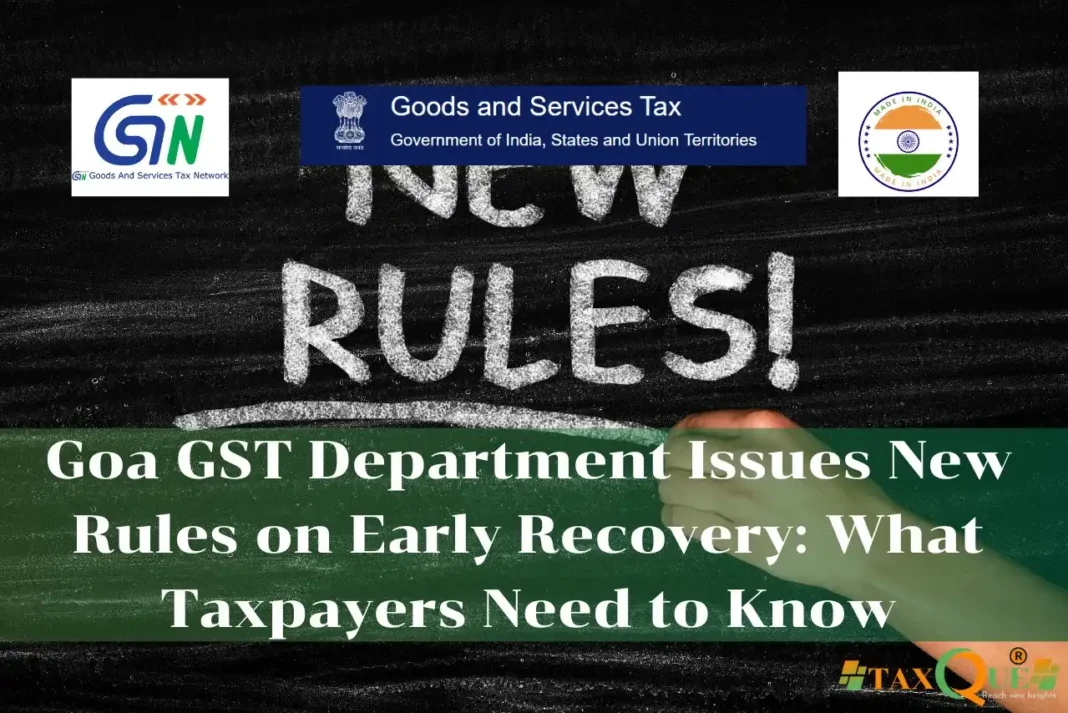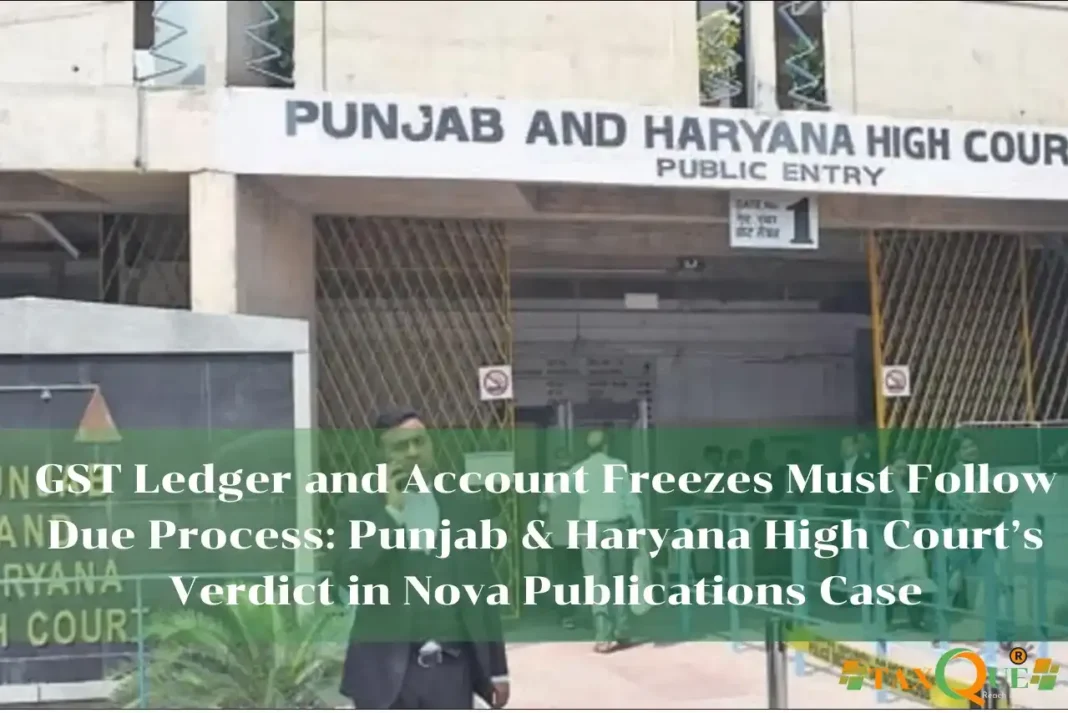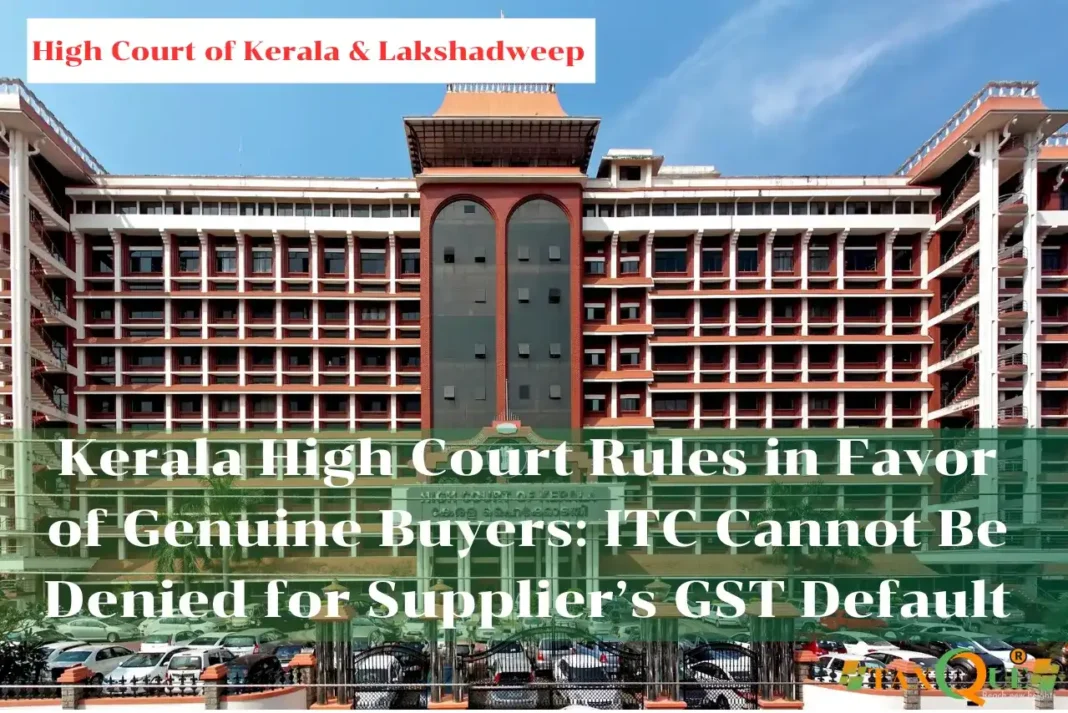Goa GST Says: No Early Tax Recovery Without Just Cause — Here’s What Businesses Must Know!
Introduction
The Goa GST Department, on 3rd June 2024, issued a new instruction based on the CBIC directive (Instruction No. 01/2024-GST) that affects how and when the tax authorities can start recovery proceedings after issuing a demand order under the Goa GST Act, 2017.
Normally, a taxpayer gets 3 months to pay the dues after receiving a demand order. But now, this new instruction explains the conditions under which recovery can begin earlier, and the precautions officers must take before doing so.
Instruction Details Summary (for reference)
| Details | Information |
|---|---|
| Issuing Authority | Goa Commissioner of State Tax |
| Instruction Date | 3rd June 2024 |
| Reference | Based on CBIC Instruction No. 01/2024-GST (30-05-2024) |
| Law Involved | Section 78 and Section 79 of Goa GST Act, 2017 |
| Purpose | To control early recovery before 3 months from demand order |
| Safeguards Added | Early recovery allowed only with Commissioner’s written approval and valid reason |
What the Rule Says
| Topic | Explanation |
|---|---|
| Normal Rule | You have 3 months to pay after getting a demand order under Section 78. |
| Early Recovery Option | Tax officer can ask for earlier payment only if there is a valid reason (e.g., risk to revenue). |
| Who can approve early recovery | Only the Commissioner of State Tax, Goa can allow early recovery after written justification. |
| How recovery happens | Under Section 79, through steps like bank attachment, property seizure, etc. |
| What must be recorded | Written reasons showing risk to revenue, like business closing, insolvency, etc. |
| Fairness clause | Officer must check the financial condition and credibility of taxpayer before issuing early payment order. |
| Local Reference Change | Goa replaces older Central Circular with its own order dated 29-04-2022 for internal governance. |
Why This Instruction Was Needed
The Central Board (CBIC) noticed that some tax officers were starting recovery actions too early — even before 3 months passed, and without proper reasons.
This was creating stress for honest taxpayers and affecting business operations. So, the government issued this instruction to:
- Protect taxpayers from premature and unfair recovery.
- Ensure only high-risk cases are acted upon early.
- Promote a fair and transparent tax system.
When Can Early Recovery Happen?
The officer can ask for payment before 3 months only when there is a strong reason, such as:
- Risk that the business will shut down soon.
- The taxpayer is in financial trouble or close to insolvency.
- There’s a chance the taxpayer will disappear without paying.
- The case is linked to Insolvency and Bankruptcy Code (IBC) proceedings.
📌 Important: These reasons must be based on evidence and not guesswork. They must be written and recorded clearly.
Who Has the Final Say?
In Goa, the Commissioner of State Tax is the only person who can approve early recovery.
Here’s how it works:
- The Deputy/Assistant Commissioner wants to recover early.
- They must send a written request to the Commissioner with full reasons.
- The Commissioner will check:
- Is the taxpayer likely to default?
- Is there real danger to government revenue?
- If satisfied, the Commissioner issues a formal direction to collect earlier.
- If the taxpayer still doesn’t pay, recovery starts under Section 79.
Safeguards for Taxpayers
✅ You are safe from early recovery unless:
- The Commissioner personally orders it.
- Valid, written reasons are recorded.
✅ You should:
- Keep track of demand orders.
- Use your 3-month window wisely (file appeals or pay if needed).
- Ask for a copy of the order if early recovery is being done.
What Should Businesses Do Now?
- 🧾 Track GST notices and demand orders closely.
- 📧 Stay in contact with tax officers and reply to notices on time.
- 📂 Maintain clean financial records to show you are not at risk.
- 🏛️ Use your right to appeal during the 3-month period if you disagree with the demand.
Conclusion
The new instruction by the Goa GST Department aims to balance revenue protection with taxpayer rights. It’s a strong reminder that early recovery is not to be used casually — and officers must follow rules strictly.
For businesses, this is a step forward in improving transparency and fairness in GST enforcement.
FAQs
Q1. What is the standard time to pay a GST demand after the order is passed?
👉 Normally, taxpayers get 3 months from the date of the demand order under Section 78 of the Goa GST Act.
Q2. Can the tax department start recovery before 3 months?
👉 Yes, but only in special cases where there is a real risk to revenue. The officer must get written permission from the Commissioner with proper justification.
Q3. What are valid reasons for early recovery?
👉 Examples include:
- The business is closing or relocating
- The taxpayer is facing insolvency
- The taxpayer is likely to default or disappear
- IBC proceedings are ongoing
Q4. Who can approve early recovery in Goa?
👉 Only the Commissioner of State Tax, Goa can approve early recovery actions — not lower officers.
Q5. What can I do if early recovery starts without approval or reason?
👉 You can:
- Ask for a copy of the Commissioner’s order
- File a representation or complaint
- Seek legal remedy through appeal or High Court, if rights are violated
Q6. Is this rule new across India?
👉 The base guideline came from CBIC Instruction No. 01/2024-GST, but Goa issued its own version to guide its state officers.
Disclaimer
This blog is for informational purposes only. It is based on the Goa GST Department’s instruction dated 3rd June 2024 (Instruction No. 01/2024-GST, ref. CBIC directive dated 30-05-2024). It does not substitute legal advice. Please consult a tax advisor for case-specific guidance.





